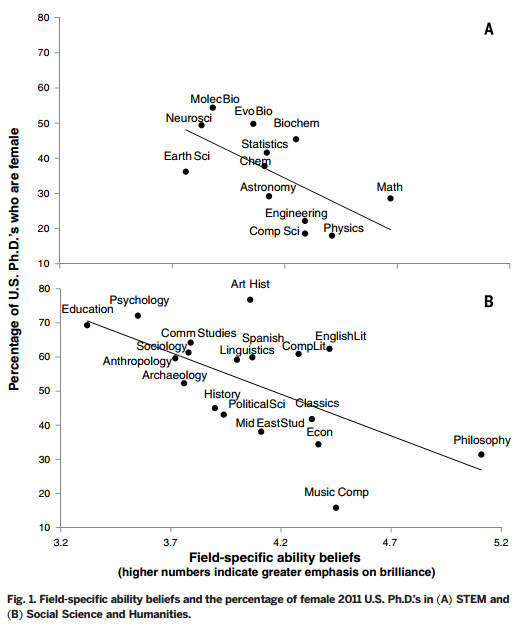A new study led by philosopher Sarah-Jane Leslie challenges the idea that women are under-represented in STEM fields. The researchers first note that there are some STEM fields where women do well (they are 54 percent of molecular biologists, for example) and some humanities fields where they don’t (they are only 31 percent of philosophers). Something else, they gathered, must be going on.
They had a hunch. They asked 1,820 United States academics what it took to be successful in their field. They were particularly interested in answers that suggested hard work and ones that invoked brilliance.
Their results showed a clear relationship between the presence of women in a field and the assumption that success required brilliance. The downward sloping line represents the proportion of female Ph.D.s in STEM fields (top) and social science and humanities fields (bottom) as they become increasingly associated with brilliance:

Interviewed at Huffington Post, Leslie says:
Cultural associations link men, but not women, with raw intellectual brilliance … consider, for example, how difficult it is to think of even a single pop-cultural portrayal of a woman who displays that same special spark of innate, unschooled genius as Sherlock Holmes or Dr. House from the show “House M.D.,” or Will Hunting from the movie “Good Will Hunting.”
In contrast, accomplished women are often portrayed as very hard working (and often having given up on marriage and children, I’ll add). She continues:
In this way, women’s accomplishments are seen as grounded in long hours, poring over books, rather than in some special raw effortless brilliance.
They extended their findings to race, testing whether the relationship held for African Americans, another group often stereotyped as less intelligent, and Asians, a group that attracts the opposite stereotype. As hypothesized, they found the relationship for the first group, but not the second (note the truncated y-axis).

The long term solution to this problem, of course, is to end white and Asian men’s claim on brilliance. In the meantime, the research team suggests, it may be a good idea to stop talking about some fields as if they’re the rightful home of the naturally brilliant and start advocating hard work for everyone.
This post originally appeared on Sociological Images, a Pacific Standard partner site, as “Beliefs About Brilliance and the Demography of Academic Fields.”




